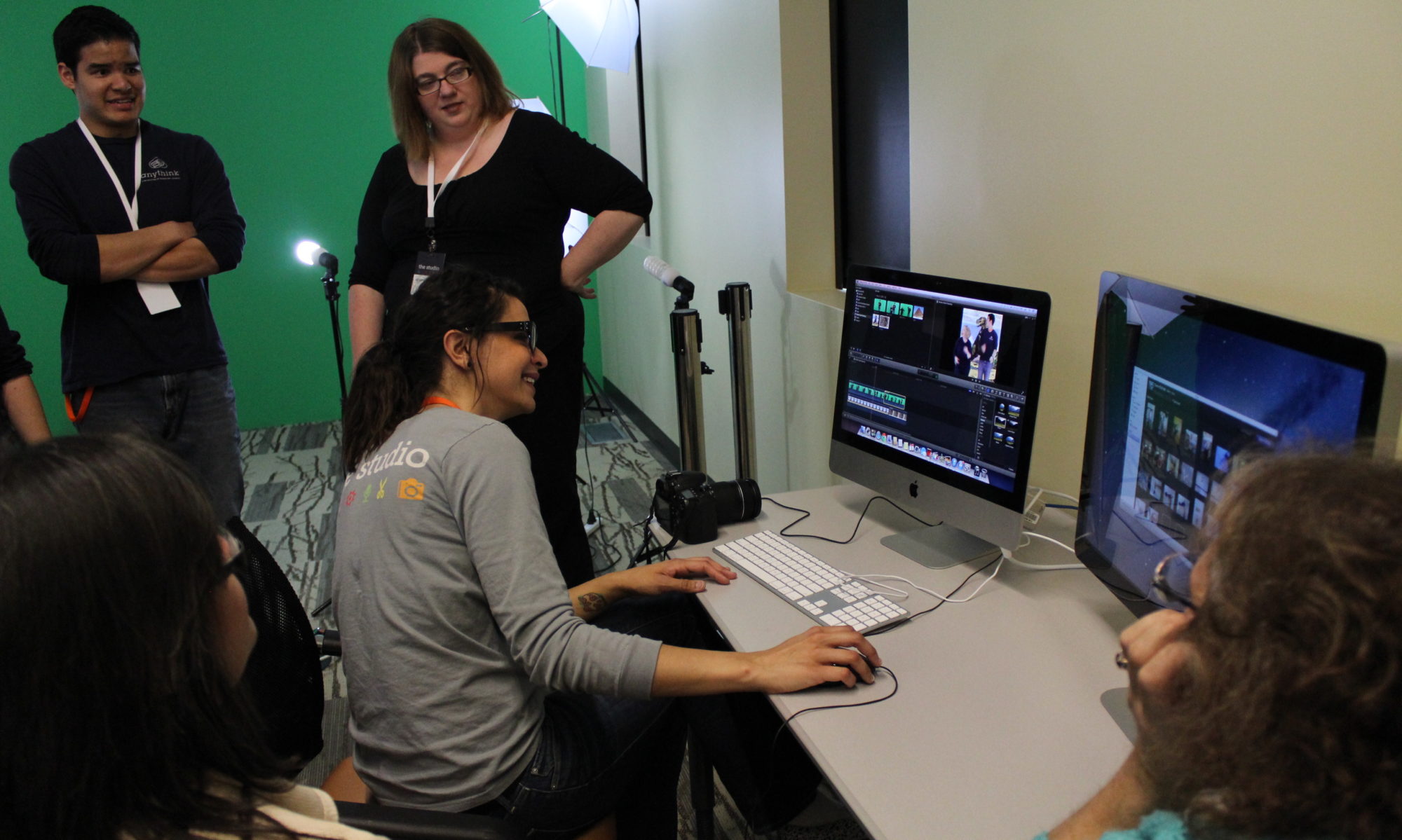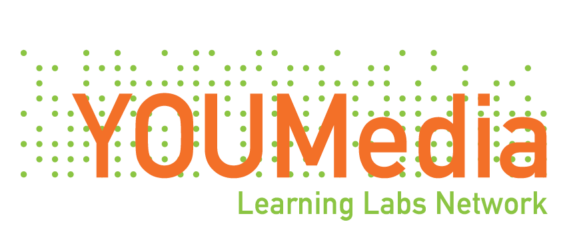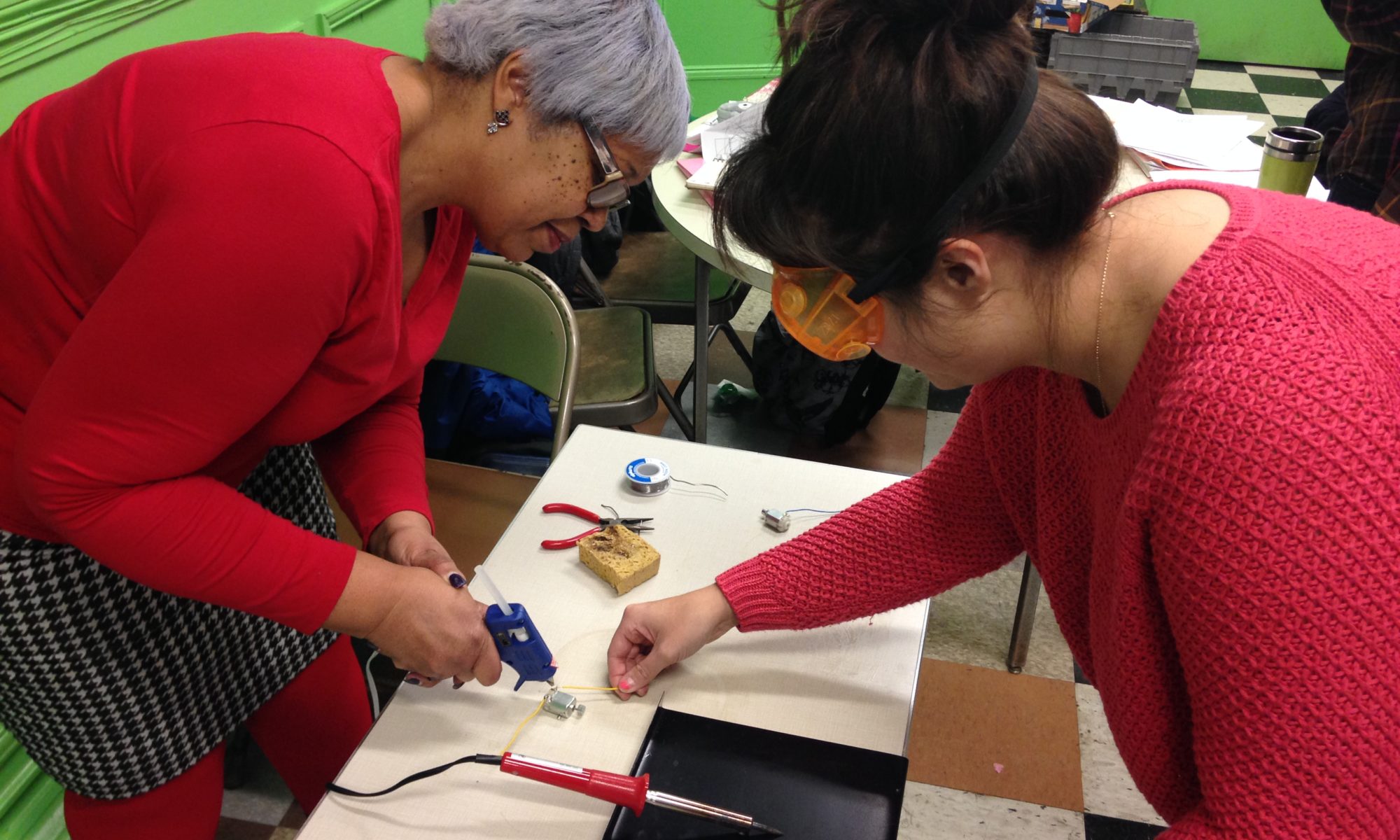By Goda Trakumaite of Maker Jawn @ Free Library of Philadelphia
Maker Jawn takes place in just 5 of the Free Library of Philadelphia’s 54 sites. How can a small-scale program within a large institution be viewed as valuable resource for the whole library system? How can we effectively share our resources and skills through collaborations with other library staff and programs?
The Maker Jawn initiative is a program that takes place in 5 of the 54 libraries in the Free Library of Philadelphia system. We facilitate daily programming in a small fraction of FLP locations but in order to sustain ourselves we strive to be recognized as an important presence and resource within the larger system. We do this by sharing equipment, materials, program and facilitation ideas with all other Free Library sites whenever possible, but this work is not always compatible with our mission of providing unique and consistent spaces for exploration and experiential learning at our program sites.
We have worked to meaningfully expand our presence throughout the FLP system in a variety of ways that include professional development for other library staff, collaboration with more established and larger-spanning library programs, presence at large-scale library events, and working on developing ways to share equipment and curriculum resources with non-Maker Jawn libraries.
Maker Mentors often lead hands-on professional development sessions for library staff members on specific curriculum and activities, as well as the “Maker” facilitation style. These sessions typically take place at the FLP’s all-staff PD in-service, and at smaller geographically-based branch cluster meetings. These PD sessions generally include 5 or more stations through which library staff rotate to test out different activities and talk to Mentors about how to run these activities at their own library sites. As take-aways, we prepare written curriculum with clear step-by-step directions and use materials that are inexpensive or readily available at most library sites. These station-style exposure activities have also been brought to a variety of FLP-organized community events.
We have also worked to engage the Free Library’s LEAP (Literacy Enrichment After-school Program) in a formal collaboration. LEAP takes place at all 54 library sites, and in North Philadelphia, shares space, time and an audience with the Maker Jawn program. LEAP’s work is focused specifically around homework help and literacy-based activities, but the missions of Maker Jawn and LEAP are relevant to one another in that both aim to serve and support youth in learning experiences. The Maker Jawn/LEAP collaboration has taken place through monthly joint professional development sessions wherein Maker Mentors with specific skillsets lead trainings for the other Mentors and LEAP Leaders around specific projects or general tool use. Past sessions have focused on carpentry tools, copper tape circuits, sewing machines, and a DNA extraction activity. These sessions have also aimed to bring LEAP Leaders into the “Maker” mindset, and help the LEAP Leaders and Mentors build more trust and cooperation in the way they facilitate programming at their sites. One LEAP Leader reflected after a joint PD session:
”First, I must state that I was confused about the MAKER program. I did not understand the MAKER philosophy. Because of my own OCD, and experience as a school teacher, I strive for some type of structure. I like creating deadlines, calendars and lesson plans. But I found that having the stuff planned can be good and bad. It’s a great way to promote any activity and get people excited about the program, but the calendar is bad for flexibility and limits kid feedback if you are planning in advance. Now, I realize that. I am always very nervous about letting kids use materials such as box cutters, rubbing alcohol, soldering tools, etc. I am working on not being so cautious. I feel that the Maker program is a remarkable addition to any library branch. They bring creativity, fun and innovative activities to the students. I look forward to our monthly training meeting because I am also learning something new.”
Finally, to further achieve sustainability within the library system, we have begun developing kits of curriculum and equipment that could travel to various library locations and could be used by any staff to facilitate programming at their sites. This idea was proposed in the final year of our 3-year IMLS grant as a potential solution for continuing the Maker Jawn program at the conclusion of this grant. Without this funding source, we face a greatly reduced budget, which means we will be working with limitations regarding supplies, but more importantly, regarding the ability to hire and guarantee staff hours. While kit development fits into our broader practice of intra-library professional development in “Maker” philosophy, we see this as an inadequate alternative to the unique and cherished spaces we have worked hard to cultivate over the last 3+ years.
We are committed to sharing our resources and values throughout the library system, but the success of the program thus far has not rested on Maker Jawn’s access to tools or even specific skills. Instead it has relied on dedicated Mentors’ committed and long-term presence at their library locations. This presence has led to the development of deep interpersonal relationships between Mentors and program participants. Maker Jawn’s goal within the institution is to be viewed and utilized as a resource by the entire system, but not at the cost of the focus on committed staff who run dedicated spaces and provide programming responsive to the specific needs and interests of patrons at those sites. Thereby while kits may provide a way to more effectively share material and curriculum resource with the library system as a whole, in order to provide a meaningful on-going experience for library patrons, Maker Jawn needs to seek funding and support to be able to maintain a robust and committed Mentor staff.
Related Resources:


